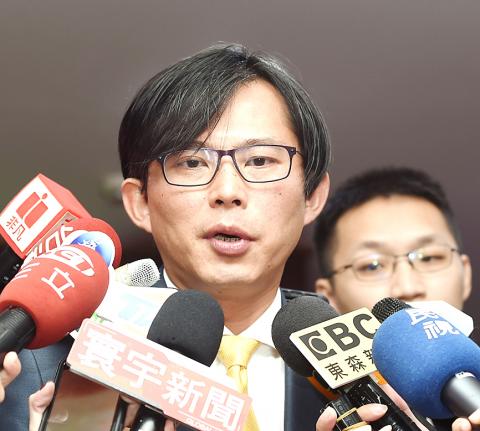New Power Party (NPP) Legislator Huang Kuo-chang (黃國昌) yesterday accused Kaohsiung Mayor Han Kuo-yu’s (韓國瑜) father-in-law’s family of occupying more than 1 hectare of public land in Yunlin County for 19 years.
During an interpellation session at the Legislative Yuan’s Finance Committee, Huang said that the family of former Yunlin County councilor Lee Jih-kuei (李日貴), Han’s father-in-law, had allegedly occupied the land since 2000 and did not return it to the government until August this year.
Between 2002 and 2008, the family twice offered to buy the land from the government, but without success, he said, following up allegations he made on Friday that Han, the Chinese Nationalist Party’s (KMT) presidential candidate, and his wife, Lee Chia-fen (李佳芬), were involved in illegal gravel excavation along a bank of the Jhuoshui River (濁水溪) in Yunlin County.

Photo: Fang Pin-chao, Taipei Times
Between 1998 and 2005, Da-tong Gravel Co (大通砂石行), owned by Lee Jih-kuei, was fined multiple times for illegally occupying public land and storing gravel in the area, Huang said on Friday.
National Property Administration (NPA) Director-General Tseng Kuo-chi (曾國基) told the Finance Committee that the central government had not leased the land to the Lee family between 2000 and 2005, but in 2006, the Yunlin County Government agreed to the family’s 10-year plan to develop the area into a recreational farm.
However, in June, just three months before the contract was due to expire, the NPA discovered that the project had not been carried out, which is why the land was returned in August, he said.
To determine if the family had illegally excavated gravel, the NPA has applied for aerial shots of the area, he said, adding that an investigation would take two weeks.
Describing the Lee family’s use of the land as “privileged people stealing national resources,” Huang yesterday asked why authorities had not asked them to return the land until this year.
“I demand that the Ministry of Finance thoroughly investigate the matter to find out if there has been any abuse of power or other illicit behavior,” the lawmaker posted on Facebook later in the day. “We cannot tolerate local political factions that abuse national resources to promote their own interests in such a blatant way.”
In related news, Han spokesman Ye Yuan-zhi (葉元之) yesterday filed charges against Huang at the Taipei District Prosecutors’ Office for trying to influence the presidential election by spreading false information about Han, while in an interview with TVBS, the mayor urged Huang to talk with prosecutors if he had any evidence of wrongdoing.
“In the past couple of days he did not take any legal action, so today we are suing him, because we have done nothing wrong,” Han said.
Asked about reports that Yunlin County Council’s 1992 meeting minutes showed Lee Jih-kuei had said that “my Mainlander son-in-law [Han] decided to run for legislator after seeing the way I am making money for two months,” Han said the remarks were unrelated to Lee’s gravel business.
“What have the meeting minutes got to do with illegal gravel excavation?” he said, adding that certain media outlets are “committing murder with headlines.”

MAKING WAVES: China’s maritime militia could become a nontraditional threat in war, clogging up shipping lanes to prevent US or Japanese intervention, a report said About 1,900 Chinese ships flying flags of convenience and fishing vessels that participated in China’s military exercises around Taiwan last month and in January last year have been listed for monitoring, Coast Guard Administration (CGA) Deputy Director-General Hsieh Ching-chin (謝慶欽) said yesterday. Following amendments to the Commercial Port Act (商港法) and the Law of Ships (船舶法) last month, the CGA can designate possible berthing areas or deny ports of call for vessels suspected of loitering around areas where undersea cables can be accessed, Oceans Affairs Council Minister Kuan Bi-ling (管碧玲) said. The list of suspected ships, originally 300, had risen to about

DAREDEVIL: Honnold said it had always been a dream of his to climb Taipei 101, while a Netflix producer said the skyscraper was ‘a real icon of this country’ US climber Alex Honnold yesterday took on Taiwan’s tallest building, becoming the first person to scale Taipei 101 without a rope, harness or safety net. Hundreds of spectators gathered at the base of the 101-story skyscraper to watch Honnold, 40, embark on his daredevil feat, which was also broadcast live on Netflix. Dressed in a red T-shirt and yellow custom-made climbing shoes, Honnold swiftly moved up the southeast face of the glass and steel building. At one point, he stepped onto a platform midway up to wave down at fans and onlookers who were taking photos. People watching from inside

Japan’s strategic alliance with the US would collapse if Tokyo were to turn away from a conflict in Taiwan, Japanese Prime Minister Sanae Takaichi said yesterday, but distanced herself from previous comments that suggested a possible military response in such an event. Takaichi expressed her latest views on a nationally broadcast TV program late on Monday, where an opposition party leader criticized her for igniting tensions with China with the earlier remarks. Ties between Japan and China have sunk to the worst level in years after Takaichi said in November that a hypothetical Chinese attack on Taiwan could bring about a Japanese

The WHO ignored early COVID-19 warnings from Taiwan, US Deputy Secretary of Health and Human Services Jim O’Neill said on Friday, as part of justification for Washington withdrawing from the global health body. US Secretary of State Marco Rubio on Thursday said that the US was pulling out of the UN agency, as it failed to fulfill its responsibilities during the COVID-19 pandemic. The WHO “ignored early COVID warnings from Taiwan in 2019 by pretending Taiwan did not exist, O’Neill wrote on X on Friday, Taiwan time. “It ignored rigorous science and promoted lockdowns.” The US will “continue international coordination on infectious